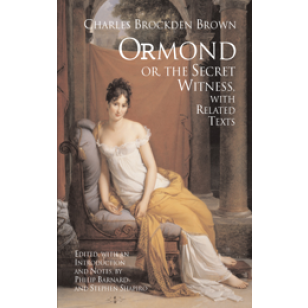Ormond; or, the Secret Witness
"Philip Barnard and Stephen Shapiro have produced an awesome edition of Brown's Ormond by providing copious explanatory notes and helpful documentation of the essential historical context of feminist, radical, egalitarian, and abolitionist expression. Oh, ye patriots, read it and learn!" —Peter Linebaugh, University of Toledo
eBook available for $17.95. Click HERE for more information.
As it tells the story of Constantia Dudley, from her family's financial collapse to her encounters with a series of cosmopolitan revolutionaries and reactionaries, Charles Brockden Brown's Ormond; or The Secret Witness (1799) develops a sustained meditation on late-Enlightenment debates concerning political liberty, women's rights, conventions of sex-gender, and their relation to the reshaping of an Atlantic world in the throes of transformation.
This edition of Ormond includes Brown's Alcuin (1798), an important dialogue on women's rights and marriage, as well as his key essays on history and literature, along with selections from contemporary writings on women's education and revolution debates that figure in the novel's background and in the charged atmosphere of the late 1790s.
Reviews:
"Philip Barnard and Stephen Shapiro have produced an awesome edition of Brown's Ormond by providing copious explanatory notes and helpful documentation of the essential historical context of feminist, radical, egalitarian, and abolitionist expression. Oh, ye patriots, read it and learn!"
—Peter Linebaugh, University of Toledo
Contents:
Acknowledgments; Introduction; A Note on the Text
Ormond; or The Secret Witness
Related Texts:
A. By Charles Brockden Brown
1. "Walstein's School of History. From the German of
Krants of Gotha" (August–September 1799)
2. "The Difference Between History and Romance"
(April 1800)
3. Two Statements on the Modern Novel
a) "Romances" (January 1805)
b) Excerpt from "Terrific Novels" (April 1805)
4. "Portrait of an Emigrant. Extracted from
a Letter" (June 1799)
5. Excerpts from Review of Gentz, The Origin and Principles
of the American Revolution compared with the Origin and
Principles of the French Revolution (January 1801)
6. Alcuin; A Dialogue (April 1798/1815)
B. Literary and Cultural Context
7. William Godwin, excerpts from Enquiry Concerning
Political Justice(1793)
8. Debates on Women's Education and Rights
a. Benjamin Rush, excerpts from "Thoughts Upon
Female Education, Accommodated to the Present
State of Society" (July 1787)
b. Mary Wollstonecraft, excerpts from A Vindication
of the Rights of Woman (1792)
9. William Godwin, excerpt from Memoirs of the Author of
A Vindication of the Rights of Woman (1798)
10. Female Transvestism in the Revolutionary Era
a. Excerpts from Louise Françoise de Houssay,
A Narrative of the Sufferings of Louise Francoise
de Houssay (1796)
b. Excerpts from Herman Mann, The Female Review (1797)
11. "French" Mores in 1790s Philadelphia
a. Moreau de Saint-Méry, excerpts from Voyage to
the United States of America, 1793–98 (1806–1812)
b. John F. Watson, excerpts from Watson's Annals of
Philadelphia and Pennsylvania (1830–1842)
c. Louis-Sébastien Binet, image from Restif de la
Bretonne, The Perverted Peasant (1776)
d. Charles Willson Peale, portrait of Benjamin and
Eleanor Ridgely Laming (1788)
12. Narratives of French Girondin Heroism
a. Helen Maria Williams on Charlotte Corday,
excerpts from Letters Containing a Sketch of the
Politics of France (1795)
b. Elihu Hubbard Smith, Diary Entry for
August 5–6, 1796
13. Illuminati Debates
Timothy Dwight versus John Ogden (1798–1799)
14. C. F. Volney, excerpt from View of the Climate and Soil of
the United States of America (1804)
15. Elihu Palmer, excerpts from The Political Happiness
of Nations (1800)
Bibliography and Works Cited
About the Authors:
Philip Barnard is Professor in the Department of English at the University of Kansas.
Stephen Shapiro is Professor in the Department of English and Comparative Literary Studies at the University of Warwick.







